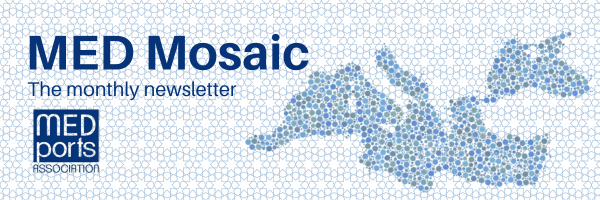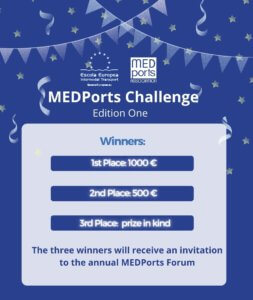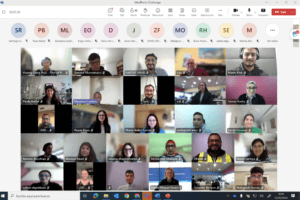MED MOSAIC

Issue 9
HOT SEAT:
Interview with Marta Miquel – Chief Business Officer at the Escola Europea – Intermodal Transport and Coordinator of the MEDports Challenge
The MEDPorts Challenge Ignites Innovation and Sustainability in Maritime Sectors
- How do you feel the MEDPorts Challenge went, and were there any standout moments for you during the event?
The MEDPorts Challenge was a resounding success, exceeding all our expectations. More than 70 participants with 13 different nationalities registered to the event. A standout moment for me was re-encountering many of the participants of the YEP MED project, which was developed together with many ports from the MEDPorts Association.
Also the enthusiasm of the participants since we launched the challenge has been very motivating for the organisation and has been translated into a great success.
- In what ways do initiatives like the MEDPorts Challenge motivate new generations to work in port and maritime sectors?
Initiatives like the MEDPorts Challenge serve as a dynamic platform for engaging young minds with the real-world challenges and opportunities in the port and maritime sectors and connect them to show the opportunities of the sector.
By presenting these industries as areas ripe for innovation and crucial for sustainable development, we’re not only showcasing the exciting career paths available but also demonstrating the sector’s impact on global trade and environmental stewardship.
- How can events like this help identify talent within different communities and what impact does that have on the industry?
Events like the MEDPorts Challenge act as a beacon, attracting bright minds passionate about ports and logistics, and sensitive about sustainability and innovation. The challenge has provided the participants the opportunity to demonstrate their knowledge and skills. For each port community, this activity should become a place to recognize and tap into diverse talent pools, so they can find and engage with the best candidates to work on their ports. To foster this engagement, the industry should focus on creating more educational programs or activities like the MEDPorts Challenge, offering internships and mentorship opportunities, and actively participating in conversations on platforms where young people are present. The identification of the talent will drive the Mediterranean ports to become key actors in the global scenario.
- What added value does organizing initiatives encouraging sustainability and conscious decision-making in transport bring to the organization?
Organizing such initiatives brings immense value to the organization by aligning with core sustainability goals and fostering a culture of innovation and environmental responsibility. It signals the commitment of MEDPorts to not just economic success of its members and the Mediterranean area, but to nurturing the next generation of leaders and promoting practices that ensure the well-being of our region. Engaging young people and inspiring a new generation to pursue careers in maritime sectors , in particular, helps invigorate our sectors with fresh ideas and a forward-thinking mindset, crucial for sustainable growth.
- Reflecting on the contest’s first edition, how do you see the MedPorts Challenge contributing to the industry’s future?
We have and will continue to work to make the MEDPorts Challenge a cornerstone event in the maritime and logistics industry in the Mediterranean. We want it to become a place where industry professionals, academics, and young talent gather. Industry professionals and academics must be actively involved in the motivation of the youngsters, and we think that this Challenge can bring them all together.
- How can initiatives like the MEDPorts Challenge contribute to raising awareness about the Mediterranean ports and their significance in the region?
Initiatives like the MEDPorts Challenge play a crucial role in shining a spotlight on the Mediterranean ports and highlighting their strategic importance to the region’s economy, culture, and environment. By incorporating real-world scenarios that involve these ports, we not only educate participants about the complexities and innovations of maritime logistics but also showcase the critical role these ports play in global trade networks. This increased visibility can foster a greater appreciation for the ports’ contributions to sustainable development and regional prosperity.

